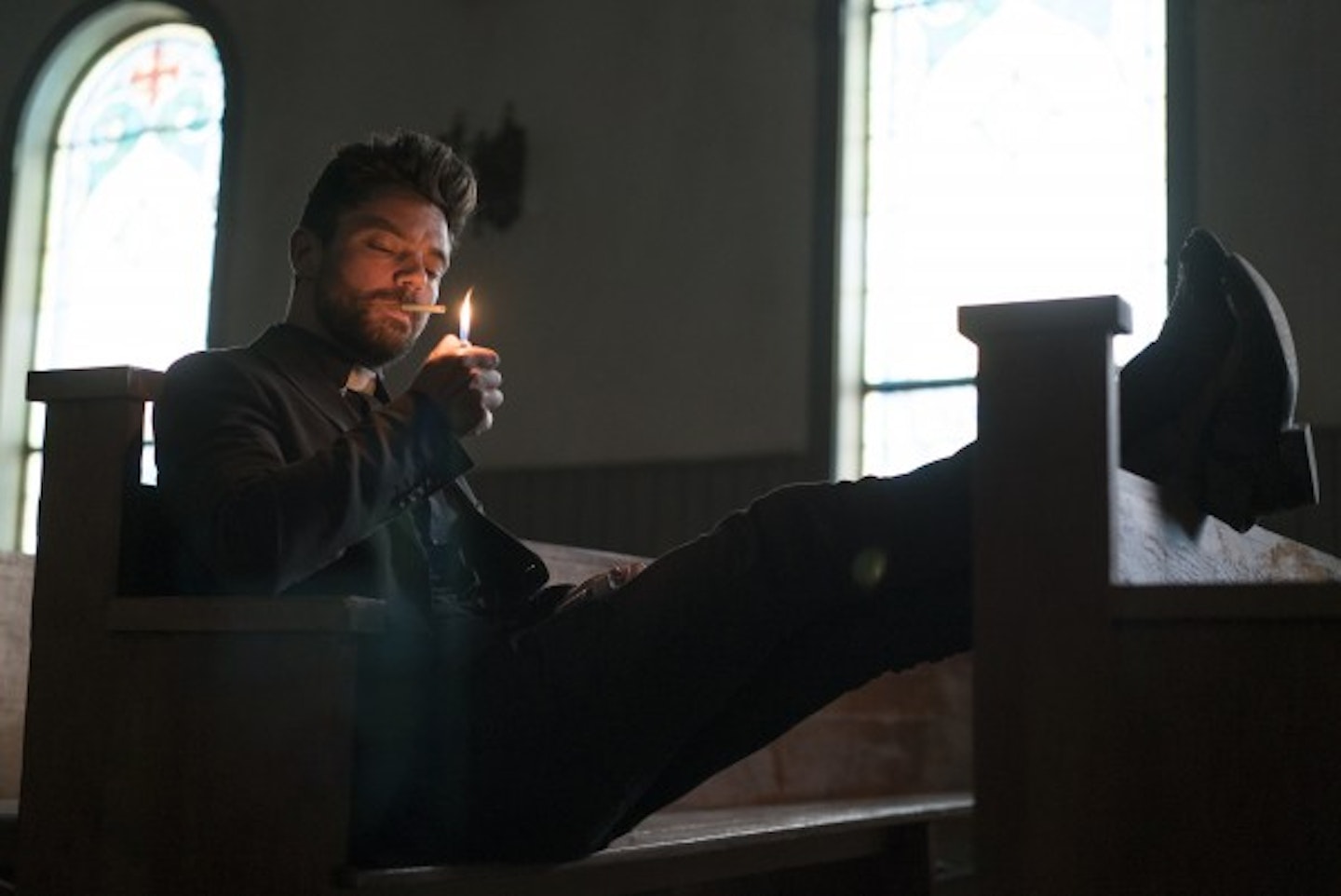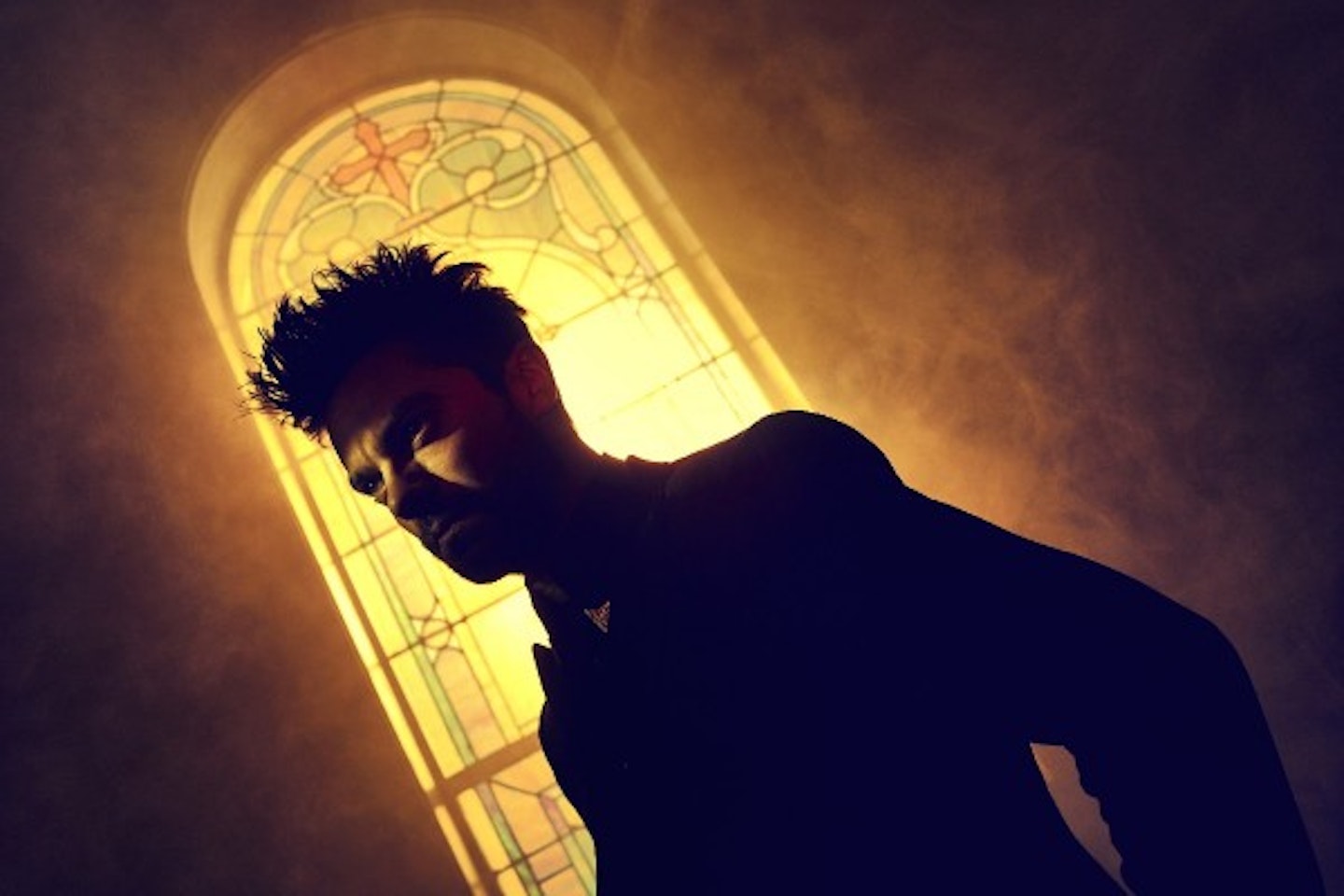Back in 1962, the posters for Stanley Kubrick’s new film asked how they ever made a movie of Lolita. Preacher's marketing team must kick themselves the line was already taken, because it's a fair question: how do you take one of the edgiest comics of the '90s, nay all time, and make it palatable for an American TV audience? And how do you anchor a series rooted in taking the mickey out of very American iconography around one Dominic Edward Cooper, who hails not from Greenwich, Alabama but from Greenwich, Sarf London?
Cooper admits being unaware of the source material when he was first approached, so he wasn't long into the script when he had his first 'WTF?' moment. "It read really normally," he says, "then I was suddenly confronted by a guy with an arse for a face. I thought they'd lost their minds."
The script read really normally, until I was suddenly confronted by a guy with an arse for a face.
Empire guesstimates that came when the page count was still in the single figures – and there’s more. Much more.
As well as said Arseface (the product of botched surgery after a Cobain-inspired suicide attempt) Preacher features some of the most outré ideas and imagery you’ll find in a comic book – ideas which have stymied previous adaptation attempts by everyone from Sam Mendes to Kevin Smith. There are multiple castrations, Nazi fetishism, bestiality a-plenty, and a beef magnate has sex with a giant woman made out of meat cuts. Rarely a page goes by without more blood flowing than your average medieval battlefield.

All this accounts, of course, for its massive popularity among teenage boys of all ages and genders. It makes sense, then that the frat-friendly comedy team of Seth Rogen and Evan Goldberg are, paradoxically, the ideal guys to shepherd the at times horrific story to TV – with further ghoulish bona fides provided by the showrunner, Breaking Bad’s Sam Catlin. It sounds like their pitch to Cooper was memorable: ‘I was in this room with these big hairy blokes talking animatedly about all this insane stuff – about vampires, and battles with chainsaws, and people cutting out their own hearts. At first I thought they’d smoked too much weed, but in the end I was seduced. There's this bonkers world, sure, but the characters at its core are so strong, I was desperate to be a part of it.’
Indeed, for all its madness, it’s the central trio of characters that have really made sure has lasted – you can sever all the heads you like, but if you don’t care about who’s doing the severing, it can all get a little dull. Luckily, the comic and series alike feature a fantastically compelling lead trio – Ruth Negga continues her amazing 2016 (Loving is already bringing her awards buzz) as sparky career crim Tulip, and This Is England’s Joe Gilgun plays Cassidy, a hard-drinking Irish vampire and the most lovable mass murderer you’ll ever meet.
I thought of Jesse's crisis as a bit like a breakup. Something's left him, and he doesn’t understand why.
They both come to the small town of Annville, Texas and fall into the orbit of Cooper's Jesse Custer, Tulip's ex and a reformed criminal now carving a tentative life as a – guess what – a preacher. As if that wasn't enough, in the first episode he's infused with a rogue entity escaped from heaven called Genesis that grants him the power of the Word of God – the ability to make anyone do anything, however literal. And if all that still isn't enough, it comes as he faces a crisis in what's hitherto been a genuine faith – and amid the snuff films and barroom brawls, the show explores this in a more sophisticated way than its fake blood budget would suggest.
"I thought of Jesse's crisis as a bit like a breakup," says Cooper. "Even as he has this great power enter him, he has this feeling that something's left him, and he doesn't understand why. He's desperately looking for this voice of forgiveness, because he's had this life of crime and feels responsible for his father's death. He desperately wants his faith back."
This being Preacher, Jesse faces this as much with his fists as with introspection – he's not as reformed as he'd like - but it's the rare show that examines these issues with a relatively straight face. As should be clear by now, C.S. Lewis this ain't: in this world, God isn't dead, but he is a skiver, abdicating his throne and causing all manner of metaphysical chaos, and the messiah is an inbred halfwit.
Given it's not that long ago Beatles albums were burned because John Lennon made one joke about being bigger than Jesus, did this material give Cooper pause?
"I don't think it's blasphemous," he says. "I think we've moved on from the days of Life Of Brian when devout believers were more easily offended. People are more up for having a conversation now, and that's reflected in the show. Jesse's searching for this faith he requires, while Cassidy is, being a vampire, a lot more cynical about that side of things. So we have these very heavy conversations, and then it goes straight into a massively elaborate barfight. We hop from tone to tone, but underneath all the extremity and comedy, there's a really interesting character study of these three people."
I think we've moved on from the days of Life Of Brian when devout believers were more easily offended.
It's this mingling of the sacred and the extremely profane that's Preacher's trademark. Still, adaptation does require, well, adapting things. Some of the initial reaction to the show’s stateside premiere featured fans asking where this or that favoured scene was, or questioning shifts in characterisation. In truth, a straight port of the comic would be next to impossible, unless you had several billion dollars and some very open-minded actors to hand.
Instead, Rogen, Goldberg and Catlin have framed their first season as a sort-of prequel to the comic, incorporating some key events, but letting the original’s frenetic pace and time-jumping structure breathe a little as its road-trip structure is kept bound to a single town.

"It makes a lot of sense to do it this way," say Cooper. "If you're just plunged into all the craziness, it might be a little overwhelming for newcomers. This way, we can get all our pieces in play, establish them, then embark on this journey once we've established everything we need to. You have flashes of the madness, so that when we really go for, it fits."
All this makes sense – Walter White didn't start Breaking Bad as the devil incarnate, after all. That said, readers of the comic will know that our central troika all undergo journeys of a similar distance and gravity to Heisenberg's. Clearly all bets are off for the conversion process, but it wouldn't be Preacher if they didn't do some very, very questionable things – especially as Jesse learns to harness the power of the Word. Alliances are made and sundered, relationships kindled and crushed, and all manner of bodies – physical or otherwise – are pulverised. This should make for juicy TV.
"As the show goes on, Jesse gradually realises the true horror of his potential," says Cooper. "It's probably going to bring out the worst in all of us. But that's what's fun about it, isn't it?"
Preacher is available on Amazon Prime now
READ MORE: Preacher: Season 1 – pilot review
READ MORE: Preacher: Season 1, episode 2
READ MORE: Preacher: Season 1, episode 3 – The Possibilities Review
READ MORE: Preacher: Season 1, episode 4 – Monster Swamp Review
